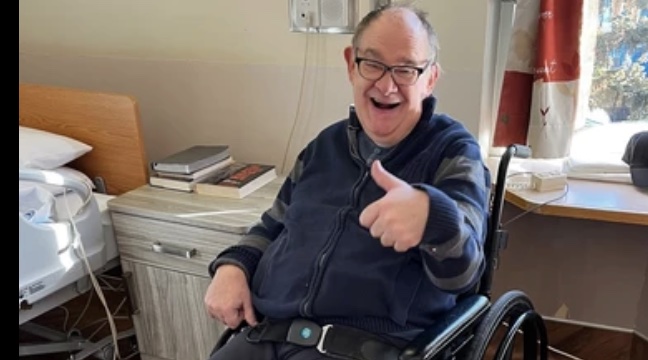Opinion
CRAZY CAM: THE AIRPORT

Mental Health
Suspect who killed 11 in Vancouver festival attack ID’d

Quick Hit:
Authorities have identified the driver responsible for the devastating attack at Vancouver’s Lapu Lapu Day festival that killed at least 11 and injured dozens more. The suspect, Kai-Ji Adam Lo, 30, had a well-documented history of mental illness, and his family sought help just hours before the tragic event.
Key Details:
- Kai-Ji Adam Lo, 30, was identified as the driver who plowed into a crowd, killing 11 and injuring dozens more.
- Lo’s family sought psychiatric help for him hours before the attack; he was already known to law enforcement.
- Police believe the attack was not terror-related, citing Lo’s extensive mental health struggles.
At least 9 dead in mass casualty event after driver crashes into crowd at Vancouver street festival.
The 30 year old driver was taken into custody by festival goers then arrested.
According to law enforcement “the suspect was known to police for certain circumstances”. pic.twitter.com/slG7LsZNFG
— Kevin Dalton (@TheKevinDalton) April 27, 2025
Diving Deeper:
The city of Vancouver is grappling with unspeakable tragedy following the deadly assault that unfolded during the Lapu Lapu Day festival, a vibrant celebration honoring the Filipino community. Authorities have identified the man behind the wheel as 30-year-old Kai-Ji Adam Lo, who was apprehended at the scene Saturday night.
Lo, whose troubled history with mental illness was well known to local authorities and mental health professionals, faces eight counts of second-degree murder, with additional charges expected as the investigation continues. According to reports, Lo’s family had reached out to a hospital psychiatric ward just hours before the incident, desperately seeking help for him amid his escalating paranoia and delusions. It remains unclear whether any intervention was made in response to the family’s call.
Vancouver Police Chief Steve Rai confirmed that Lo had no interactions with law enforcement immediately prior to the event, but acknowledged that the city is reeling from its “darkest day.” Investigators emphasized that, because of Lo’s mental state, they do not believe the attack was terror-related.
Adding to the complex portrait of the suspect, Lo was mourning profound personal loss. His brother, Alexander Lo, was murdered in January 2024. Following the death, Lo had penned heartbreaking posts online, sharing how his brother’s death and his mother’s subsequent suicide attempt shattered their family.
Tragically, among the 11 killed during Saturday’s carnage was a 5-year-old child. Dozens more were wounded when Lo drove his SUV into the densely packed crowd gathered for the festivities. Lo has since appeared in court and will remain in custody as prosecutors prepare to bring additional charges.
The horror that unfolded in Vancouver serves as a stark reminder of the broader systemic failures surrounding mental health interventions. While Canadian authorities attempt to grapple with the aftermath, this tragedy sadly echoes similar stories in other nations where warnings about individuals in crisis have gone unheeded—with catastrophic results.
Automotive
Major automakers push congress to block California’s 2035 EV mandate

 MxM News
MxM News
Quick Hit:
Major automakers are urging Congress to intervene and halt California’s aggressive plan to eliminate gasoline-only vehicles by 2035. With the Biden-era EPA waiver empowering California and 11 other states to enforce the rule, automakers warn of immediate impacts on vehicle availability and consumer choice. The U.S. House is preparing for a critical vote to determine if California’s sweeping environmental mandates will stand.
Key Details:
-
Automakers argue California’s rules will raise prices and limit consumer choices, especially amid high tariffs on auto imports.
-
The House is set to vote this week on repealing the EPA waiver that greenlit California’s mandate.
-
California’s regulations would require 35% of 2026 model year vehicles to be zero-emission, a figure manufacturers say is unrealistic.
Diving Deeper:
The Alliance for Automotive Innovation, representing industry giants such as General Motors, Toyota, Volkswagen, and Hyundai, issued a letter Monday warning Congress about the looming consequences of California’s radical environmental regulations. The automakers stressed that unless Congress acts swiftly, vehicle shipments across the country could be disrupted within months, forcing car companies to artificially limit sales of traditional vehicles to meet electric vehicle quotas.
California’s Air Resources Board rules have already spread to 11 other states—including New York, Massachusetts, and Oregon—together representing roughly 40% of the entire U.S. auto market. Despite repeated concerns from manufacturers, California officials have doubled down, insisting that their measures are essential for meeting lofty greenhouse gas reduction targets and combating smog. However, even some states like Maryland have recognized the impracticality of California’s timeline, opting to delay compliance.
A major legal hurdle complicates the path forward. The Government Accountability Office ruled in March that the EPA waiver issued under former President Joe Biden cannot be revoked under the Congressional Review Act, which requires only a simple Senate majority. This creates uncertainty over whether Congress can truly roll back California’s authority without more complex legislative action.
The House is also gearing up to tackle other elements of California’s environmental regime, including blocking the state from imposing stricter pollution standards on commercial trucks and halting its low-nitrogen oxide emissions regulations for heavy-duty vehicles. These moves reflect growing concerns that California’s progressive regulatory overreach is threatening national commerce and consumer choice.
Under California’s current rules, the state demands that 35% of light-duty vehicles for the 2026 model year be zero-emission, scaling up rapidly to 68% by 2030. Industry experts widely agree that these targets are disconnected from reality, given the current slow pace of electric vehicle adoption among the broader American public, particularly in rural and lower-income areas.
California first unveiled its plan in 2020, aiming to make at least 80% of new cars electric and the remainder plug-in hybrids by 2035. Now, under President Donald Trump’s leadership, the U.S. Transportation Department is working to undo the aggressive fuel economy regulations imposed during former President Joe Biden’s term, offering a much-needed course correction for an auto industry burdened by regulatory overreach.
As Congress debates, the larger question remains: Will America allow one state’s left-wing environmental ideology to dictate terms for the entire country’s auto industry?
-

 Media2 days ago
Media2 days agoCBC retracts false claims about residential schools after accusing Rebel News of ‘misinformation’
-

 Bjorn Lomborg2 days ago
Bjorn Lomborg2 days agoNet zero’s cost-benefit ratio is CRAZY high
-

 2025 Federal Election2 days ago
2025 Federal Election2 days agoMark Carney Wants You to Forget He Clearly Opposes the Development and Export of Canada’s Natural Resources
-

 2025 Federal Election2 days ago
2025 Federal Election2 days agoPolice Associations Endorse Conservatives. Poilievre Will Shut Down Tent Cities
-

 2025 Federal Election1 day ago
2025 Federal Election1 day agoCarney’s Hidden Climate Finance Agenda
-

 2025 Federal Election1 day ago
2025 Federal Election1 day agoPolls say Canadians will give Trump what he wants, a Carney victory.
-

 2025 Federal Election1 day ago
2025 Federal Election1 day agoColumnist warns Carney Liberals will consider a home equity tax on primary residences
-

 2025 Federal Election1 day ago
2025 Federal Election1 day agoNine Dead After SUV Plows Into Vancouver Festival Crowd, Raising Election-Eve Concerns Over Public Safety




